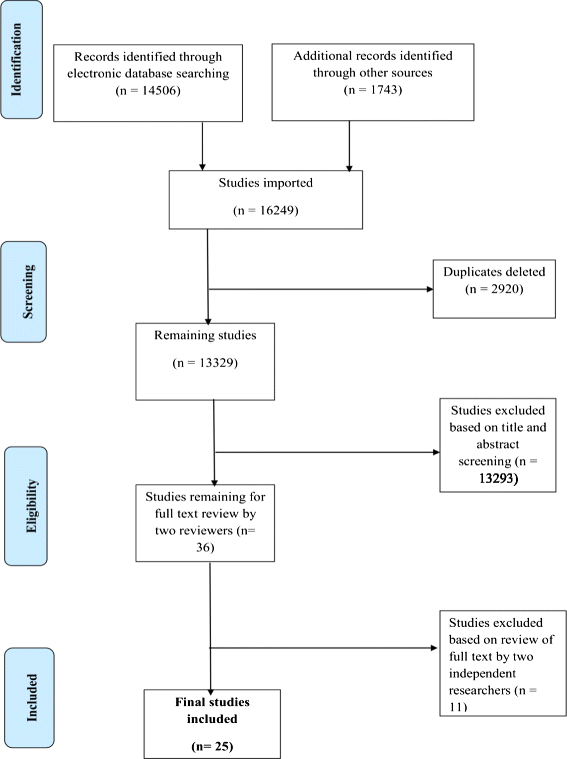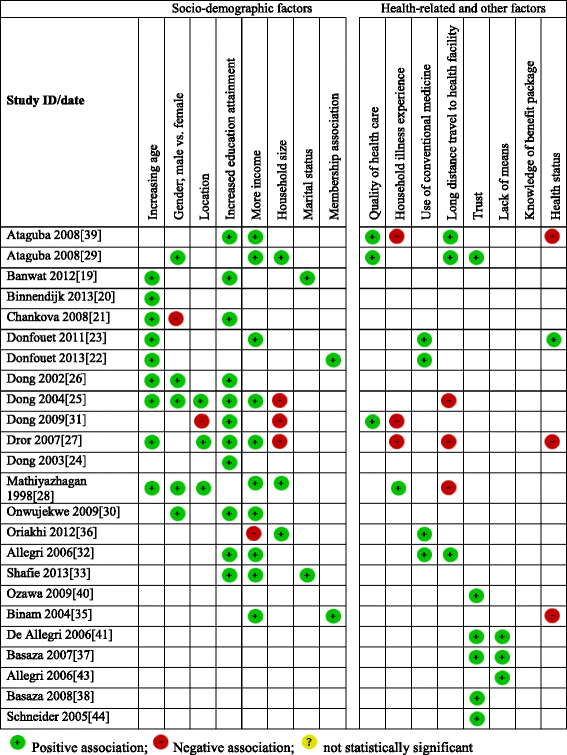A systematic review of factors that affect uptake of community-based health insurance in low-income and middle-income countries
- PMID: 26645355
- PMCID: PMC4673712
- DOI: 10.1186/s12913-015-1179-3
A systematic review of factors that affect uptake of community-based health insurance in low-income and middle-income countries
Abstract
Background: Low-income and middle-income countries (LMICs) have difficulties achieving universal financial protection, which is primordial for universal health coverage. A promising avenue to provide universal financial protection for the informal sector and the rural populace is community-based health insurance (CBHI). We systematically assessed and synthesised factors associated with CBHI enrolment in LMICs.
Methods: We searched PubMed, Scopus, ERIC, PsychInfo, Africa-Wide Information, Academic Search Premier, Business Source Premier, WHOLIS, CINAHL, Cochrane Library, conference proceedings, and reference lists for eligible studies available by 31 October 2013; regardless of publication status. We included both quantitative and qualitative studies in the review.
Results: Both quantitative and qualitative studies demonstrated low levels of income and lack of financial resources as major factors affecting enrolment. Also, poor healthcare quality (including stock-outs of drugs and medical supplies, poor healthcare worker attitudes, and long waiting times) was found to be associated with low CBHI coverage. Trust in both the CBHI scheme and healthcare providers were also found to affect enrolment. Educational attainment (less educated are willing to pay less than highly educated), sex (men are willing to pay more than women), age (younger are willing to pay more than older individuals), and household size (larger households are willing to pay more than households with fewer members) also influenced CBHI enrolment.
Conclusion: In LMICs, while CBHI schemes may be helpful in the short term to address the issue of improving the rural population and informal workers' access to health services, they still face challenges. Lack of funds, poor quality of care, and lack of trust are major reasons for low CBHI coverage in LMICs. If CBHI schemes are to serve as a means to providing access to health services, at least in the short term, then attention should be paid to the issues that militate against their success.
Figures
References
-
- Mills A, Ataguba JE, Akazili J, Borghi J, Garshong B, Makawia S, Mtei G, Harris B, Macha J, Meheus F, McIntyre D. Equity in financing and use of health care in Ghana, South Africa, and Tanzania: implications for paths to universal coverage. Lancet. 2012;380:126–133. doi: 10.1016/S0140-6736(12)60357-2. - DOI - PubMed
-
- McIntyre D. Learning from experience: Health care financing in low-and middle-income countries. Geneva: Global forum for health research; 2007.
-
- Gottret PE, Schieber G. Health financing revisited: a practitioner’s guide. Washington: World Bank Publications; 2006.
-
- Knaul FM, Arreola-Ornelas H, Méndez-Carniado O, Bryson-Cahn C, Barofsky J, Maguire R, Miranda M, Sesma S. Evidence is good for your health system: policy reform to remedy catastrophic and impoverishing health spending in Mexico. Lancet. 2006;368:1828–1841. doi: 10.1016/S0140-6736(06)69565-2. - DOI - PubMed
Publication types
MeSH terms
LinkOut - more resources
Full Text Sources
Other Literature Sources
Medical



